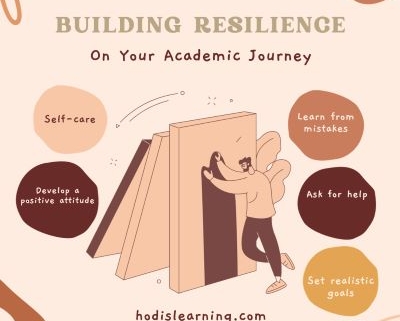Every student faces challenges on their academic journey. Whether it’s a difficult class, a bad grade, or a personal setback, everyone experiences moments of doubt and discouragement. But the most successful students are those who are able to overcome these challenges and build resilience.
Resilience is the ability to bounce back from adversity. It’s about having the strength and perseverance to keep going even when things are tough. Resilient students are able to learn from their mistakes, adapt to change, and stay motivated in the face of challenges.
Building Resilience
- Take care of yourself. Make sure to get enough sleep, eat healthy foods, and exercise regularly. Taking care of your physical and mental health will give you the energy and focus you need to succeed academically.
- Don’t be afraid to ask for help. If you’re struggling, don’t be afraid to ask for help from a teacher, tutor, or classmate. There are many people who are willing to help you succeed. Consider getting expert tutoring help from Hodis Learning & Music.
- Set realistic goals. Don’t set yourself up for failure by setting unrealistic goals. Break down large goals into smaller, more manageable ones. This will help you to stay on track and motivated. See: SMART Goals.
- Develop a positive attitude. A positive attitude can go a long way in helping you to overcome challenges. Focus on your strengths and believe in yourself.
- Learn from your mistakes. Everyone makes mistakes. The important thing is to learn from them and move on. Don’t let your mistakes discourage you.
Specific Examples
Here are some specific examples of how students can build resilience in the face of common academic challenges:
- Dealing with a difficult class. If you’re struggling in a particular class, don’t give up. Talk to your teacher about what you’re struggling with and ask for help. You may also want to consider forming a study group with other students in the class or hiring a tutor.
- Getting a bad grade. Everyone gets bad grades from time to time. It’s important to not let one bad grade define you. Instead, use it as an opportunity to learn and grow. Analyze your performance on the test or assignment and identify areas where you can improve.
- Experiencing a personal setback. If you’re going through a difficult time in your personal life, it’s important to be patient with yourself. Don’t expect to perform at your best academically when you’re dealing with personal challenges. Talk to your teachers or counselor about what you’re going through and ask for support.
Building resilience takes time and effort. But it’s an essential skill for all students to develop. Resilient students are more likely to succeed academically and in life.
Additional Tips for Building Resilience:
- Cultivate a relationship with a mentor. A mentor is someone who can provide you with guidance and support on your academic journey. They can help you to set goals, develop strategies for success, and overcome challenges.
- Build a strong support network. Surround yourself with people who believe in you and support your goals. This could include family, friends, teachers, or other students.
- Celebrate your successes. It’s important to celebrate your successes, no matter how small they may seem. This will help you to stay motivated and keep moving forward.
Remember, you’re not alone. Everyone faces challenges on their academic journey. But by building resilience, you can overcome these challenges and achieve your goals.
Get Expert Help to Build Academic Resilience
Hodis Learning & Music provides expert, individualized academic tutoring and academic coaching to students of all ages and backgrounds, helping them master course material and optimize academic performance. Learn more about our services by calling or emailing us today!




